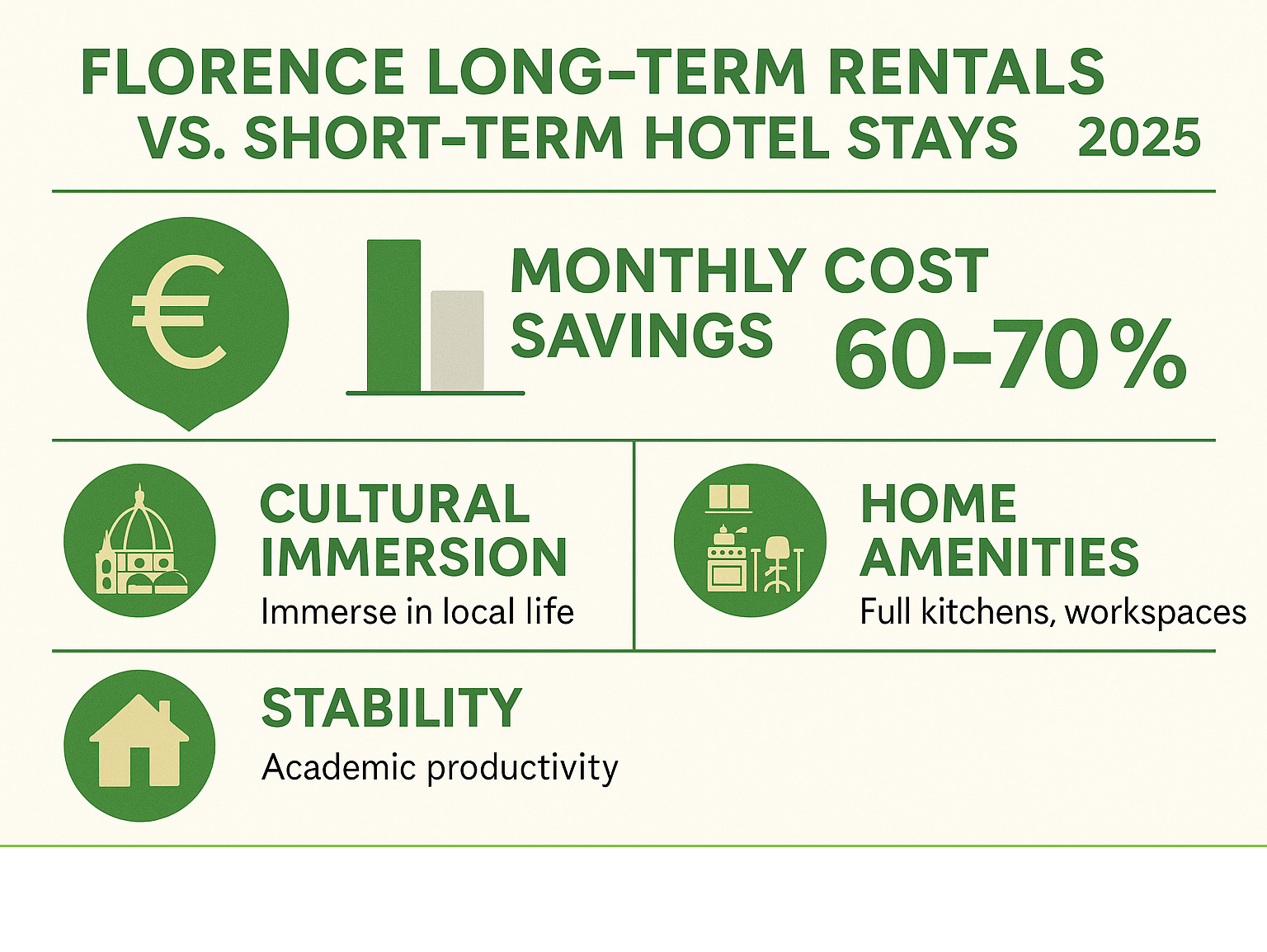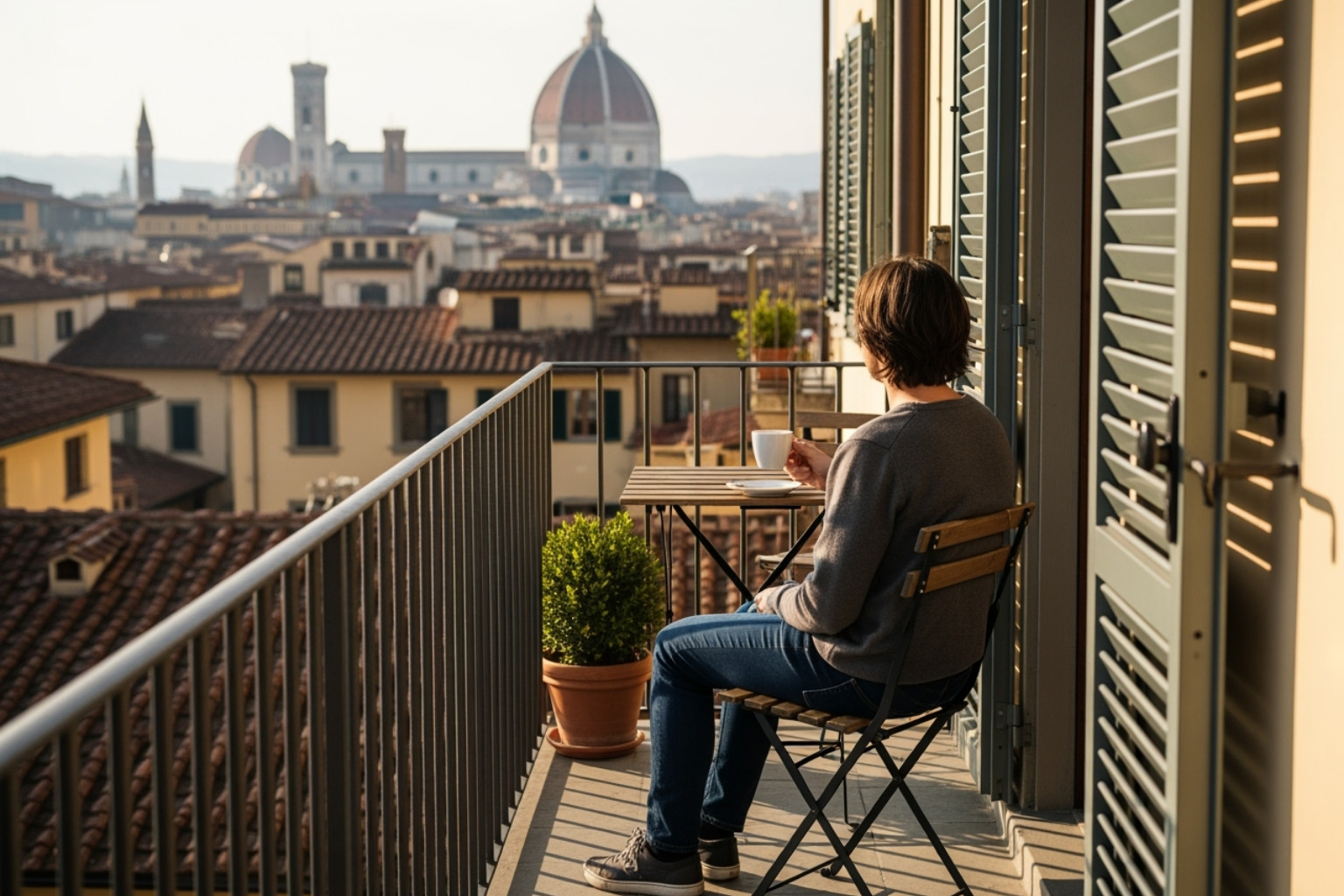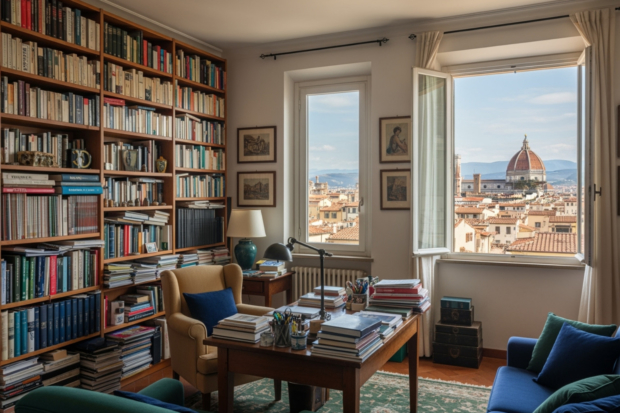Florence Long Term Rentals: Secure Your Perfect Home
How Can You Secure a Long-Term Rental in Florence, Italy?
Finding the perfect long-term home in Florence, a city that has nurtured centuries of groundbreaking thought and artistic expression, can seem like a considerable challenge. Yet, for academics, researchers, and scholars, securing the right accommodation is the foundational step to a successful and productive stay. This comprehensive guide is designed to demystify the process, offering detailed insights into every aspect of the rental journey, from understanding different property types and navigating vibrant neighbourhoods to deciphering Italian lease agreements. Our goal is to help you secure a comfortable, stable, and inspiring base for your Florentine adventure, allowing you to focus on your work and immerse yourself in the culture of the Renaissance capital.
Florence long term rentals offer academics and researchers an affordable and enriching way to experience one of the world’s most historically significant cities while maintaining the comfort and productivity essential for serious intellectual work. Whether you are on sabbatical, conducting archival research, pursuing a fellowship at the European University Institute, or teaching at a local university, the right accommodation can determine the success of your Italian sojourn. Florence provides an ideal setting for extended academic stays, with a rich ecosystem of libraries, archives, and museums. The city’s rental market reflects this, offering hundreds of furnished apartments designed for longer visits, many complete with reliable internet and quiet spaces conducive to study and writing.
Quick Guide to Florence Long Term Rentals:
- Average Cost: Approximately €30.11 per square meter monthly, though this varies significantly by location and property condition.
- Available Properties: Over 1,345 houses and apartments are typically available for long-term lease.
- Minimum Stay: Long-term contracts generally require a minimum commitment of 6 to 12 months.
- Best Areas for Academics: Centro Storico (for immersion), San Marco (near the University), Rifredi (near the medical campus), and Oltrarno (for an authentic local experience).
- Top Amenities: Fully equipped kitchens, reliable high-speed WiFi, dedicated workspaces, and air conditioning are highly sought after.
- Property Types: A wide range including studios (monolocali), multi-room apartments (appartamenti), villas, and rooms in shared housing.
- Essential First Step: Obtaining an Italian tax code (Codice Fiscale) is mandatory for signing a legal rental contract.
Since 2000, SabbaticalHomes.com has been a trusted, dedicated resource for the academic community. We connect scholars, researchers, and academics with Florence long term rentals and housing solutions across the globe. Our platform is built on a foundation of trust, leveraging deep expertise to address the specific challenges of finding reliable and suitable accommodation. We foster a community that understands and caters to the unique requirements of academic travellers, ensuring your focus remains on your research and cultural exploration.

The Financial and Lifestyle Advantages
Opting for a long-term rental in Florence over transient options like hotels or short-term holiday lets presents substantial benefits. Financially, it provides the stability of a fixed monthly cost, which is crucial for budgeting over an extended period, such as a semester or a full academic year. Committing to a longer lease often results in a more favourable monthly rate. With the average price around €30.11 per square meter, a long-term rental is a demonstrably cost-effective choice, freeing up more of your budget to experience Florence’s world-class art, history, and cuisine.
Beyond the significant savings, a long-term rental offers the invaluable opportunity to live as a resident rather than a visitor. You can establish a daily routine, discover your favourite local bakery or market, build relationships with neighbours, and truly integrate into the fabric of Florentine life. This stability fosters a profound sense of belonging, which is immensely beneficial for concentrating on demanding academic work or research. Furthermore, you gain the comforts of a genuine home: ample space to spread out, a private and quiet environment, and a fully equipped kitchen. The ability to prepare your own meals with fresh ingredients from local markets like Sant’Ambrogio is not only economical but also a deeply satisfying cultural experience, creating a personal haven where you can unwind and recharge.
A Home Base for Academics and Digital Nomads
Florence has long been a magnet for intellectuals, and today it is an increasingly attractive destination for both academics and digital nomads seeking a stimulating and inspiring work environment. A long-term rental provides the essential infrastructure for a productive and balanced stay. For scholars, a dedicated and quiet workspace is paramount. Many Florence long term rentals listed on SabbaticalHomes.com are offered by fellow academics who understand these needs, ensuring features like reliable WiFi, proper desks, and locations conducive to deep focus. Our platform is specifically designed to connect academics with homes that meet these requirements, including proximity to key institutions like the University of Florence, the Kunsthistorisches Institut, or Villa I Tatti. You can explore a curated selection of opportunities for University housing in Italy through our resources.
For digital nomads, Florence offers a compelling fusion of rich culture and modern practicality. The city’s infrastructure increasingly supports a remote work lifestyle, with growing access to high-speed fibre-optic internet and a variety of co-working spaces. A long-term rental allows for the creation of a perfect work-life balance, where a day of productive remote work can be followed by an evening stroll across the Ponte Vecchio, an aperitivo in Piazza Santo Spirito, or a visit to the Uffizi Gallery. The city’s historical grandeur and vibrant street life provide a constant source of inspiration, enriching both professional and personal pursuits.
Navigating the Florence Long Term Rental Market

Understanding the nuances of Florence’s rental landscape is the first step to finding a suitable property. With over 1,345 houses and apartments typically available, the options are diverse, ranging from compact studios tucked away in medieval towers to expansive villas nestled in the surrounding Tuscan hills. The sheer variety of Florence long term rentals ensures that everyone, from solo researchers on a tight budget to families needing more space, can find a temporary home that aligns with their needs and preferences.
Types of Properties Available
Florence’s rental market offers a variety of characterful living spaces, each with its own distinct appeal.
- Appartamento (Apartments): This is the most common type of rental. They vary enormously, from grand apartments in historic palazzi with high, frescoed ceilings and original terracotta floors, to more functional, modern units in post-war buildings. They can be found in all sizes, from one-bedroom (bilocale) to larger, family-sized apartments.
- Monolocale (Studios): These are efficient, open-plan spaces that combine living, sleeping, and kitchen areas. They are an affordable and practical choice for individual academics or couples, offering a low-maintenance base in the city.
- Villas: Typically located on the outskirts of Florence or in the hills of Fiesole or Settignano, villas offer substantial space, privacy, and often come with gardens or terraces. They are perfect for those undertaking intensive writing projects who desire tranquility, or for families. A car is often necessary for this lifestyle.
- Rooms in Shared Housing (Stanza in Appartamento Condiviso): A popular and economical choice, especially for postgraduate students and younger academics. Renting a room allows for cost-sharing on rent and utilities while also providing a social environment and an instant network of housemates.
- Terratetto (Townhouse): Less common but highly desirable, a terratetto is a self-contained house with its own private entrance, often spread over multiple floors. It offers more privacy than an apartment without being as isolated as a villa.
Most properties intended for academic stays come fully furnished (arredato), including equipped kitchens, furniture, and workspaces, allowing you to settle in with minimal fuss.
Related: Learning a Few Italian Phrases
Average Rental Prices and Associated Costs
Rental prices in Florence are a reflection of its status as a premier global destination for tourism and academia, averaging around €30.11 per square meter. However, this figure is a baseline; prices fluctuate dramatically based on location, size, condition, and amenities. When creating your budget, it is crucial to account for several additional costs beyond the monthly rent:
- Security Deposit (Deposito Cauzionale): This is a standard requirement, typically equivalent to two or three months’ rent. It is held by the landlord to cover potential damages and must be returned at the end of the lease, provided the property is left in good condition. It cannot legally be used to cover the final months’ rent.
- Utilities (Utenze): For most long-term contracts, the tenant is responsible for setting up and paying for utilities. These include electricity (elettricità), gas (gas), water (acqua), and internet. Monthly costs can range from €150 to €300+, depending on usage, season, and the energy efficiency of the building.
- Condominium Fees (Spese Condominiali): If you rent in an apartment building, you will likely have to pay these monthly fees. They cover the maintenance of shared spaces and services, such as the lift, stairwell cleaning, central heating, and building administration. These can range from €50 to over €200 per month.
- Waste Tax (TARI – Tassa sui Rifiuti): This is a municipal tax for waste collection, paid by the occupant of the property. It is billed annually or semi-annually and the amount depends on the size of the apartment and the number of occupants.
- Contract Registration Tax: A one-time tax for registering the lease with the Italian Revenue Agency is typically split 50/50 between the landlord and tenant.
Popular Neighborhoods for Extended Stays
Choosing the right quartiere (neighborhood) is a deeply personal decision that will shape your daily life in Florence.
- Centro Storico: The historic heart, encompassing the Duomo, Piazza della Signoria, and Ponte Vecchio. Living here means unparalleled access to cultural sites and a constant buzz. However, it is the most expensive area, can be crowded with tourists, and is largely within the ZTL (Limited Traffic Zone), making car ownership impractical.
- Oltrarno: Literally ‘across the Arno’, this district includes areas like Santo Spirito and San Frediano. It is known for its authentic Florentine atmosphere, artisan workshops (botteghe), and a vibrant local scene with excellent trattorias and bars. It offers a slightly more residential feel while still being central.
- Santa Croce: A lively area that blends major historical sites like the Basilica of Santa Croce with the bustling daily life of the Sant’Ambrogio market. It has a vibrant nightlife and a large student population.
- San Marco & Santissima Annunziata: Ideal for those affiliated with the University of Florence, as many faculties are located here. It provides excellent access to libraries and academic facilities and is slightly less tourist-heavy than the absolute centre.
- Campo di Marte & Rifredi: These are more modern, residential neighborhoods offering quieter streets, green spaces, and more affordable rental options. Campo di Marte is near a major train station, while Rifredi is a hub for the medical and scientific communities due to its proximity to the Careggi Hospital and the university’s science and medical campus.
- Le Cure & Gavinana: These residential areas offer a genuine local experience. Le Cure, north of the centre, is known for its daily covered market. Gavinana, south of the Arno, provides good value and green spaces like Parco dell’Albereta.
- Bellariva, Isolotto-Legnaia, & Settignano: For those seeking tranquility, these areas are further from the centre. Bellariva runs along the Arno, Isolotto-Legnaia is a large residential district with good tram links, and Settignano, in the hills, offers stunning views and a peaceful, village-like atmosphere, appealing to those needing quiet for intensive projects.
The Search Process: Finding Your Perfect Florence Home

Embarking on the search for your ideal Florence long term rental should be an exciting part of your academic journey. A methodical and well-prepared approach, based on a clear understanding of your priorities, will enable you to find a home that not only meets your practical needs but also serves as a comfortable and inspiring base for your work and cultural exploration.
Key Factors for Your Florence Long Term Rental Search
Success in your search begins with clearly defining your requirements. Consider these crucial factors before you begin looking:
- Budget: Establish a realistic and comprehensive monthly budget. This must include not only the rent but also estimates for condominium fees, utilities (gas, electricity, water, internet), and the annual waste tax (TARI). It is wise to adhere strictly to this budget to avoid financial stress during your stay.
- Location vs. Commute: Carefully weigh the benefits of living centrally against the advantages of a more residential neighbourhood. Is immediate proximity to your university, library, or archive worth a higher rental cost and potentially more noise? Or would a quieter area with a slightly longer but manageable commute via public transport be a better choice? Investigate Florence’s public transport system, run by Autolinee Toscane (AT), which includes an extensive bus network and two efficient tram lines (T1 and T2), to understand commute times from different areas. Also, be aware of the ZTL (Zona a Traffico Limitato), which severely restricts private car access in the city centre.
- Lease Term: Be transparent about the required duration of your stay from the outset. Academic calendars often do not align with standard Italian lease structures (like the 4+4 year contract). Highlighting your need for a specific term (e.g., 10 months) will help you filter for properties offering ‘transitory contracts’ designed for such situations.
- Specific Needs: Create a list of your essential requirements. Do you need a property with a lift (ascensore), which is uncommon in many older buildings? Is a ground-floor apartment a necessity for accessibility? Do you require a pet-friendly property? Filtering your search for these from the start will save considerable time.
- Furnished Rentals: The vast majority of academics and researchers prefer the convenience of a furnished home to avoid the expense and complication of buying and moving furniture for a temporary stay. You can browse currently available Homes to rent in Florence to see examples of fully equipped properties.
Best Platforms and Times to Search
Using a platform tailored to your specific needs can dramatically improve your search experience. SabbaticalHomes.com is a specialized service that focuses exclusively on connecting academics, scholars, and researchers with suitable housing. Our community is built on a foundation of mutual trust between property owners (many of whom are academics themselves) and academic tenants. This shared understanding means that listings often feature the quiet environments, dedicated workspaces, and reliable amenities that are critical for productive research and writing. This provides a more secure and targeted alternative to generalist rental websites that cater primarily to tourists or a different rental demographic.
Timing your search is also a critical strategic element. The rental market in Florence has distinct peak seasons. The busiest period is late summer (July-September) when students and incoming faculty are all searching for accommodation before the academic year begins. To face less competition and have a wider selection of properties, it is advisable to start your search several months in advance. The quieter periods of late spring (April-May) and late autumn (October-November) are often the ideal times to secure a rental.
Essential Amenities for Comfort and Productivity
To ensure your rental supports both your professional work and your personal well-being, prioritize these key amenities:
- High-Speed Internet: This is non-negotiable for any academic or remote worker. When considering a property, always confirm the type of connection (fibre-optic, fibra, is best) and its reliability. Do not hesitate to ask for a speed test result.
- Dedicated Workspace: A proper desk and an ergonomic chair situated in a quiet, well-lit area can have a significant impact on your productivity and comfort during long hours of work.
- Air Conditioning and Heating: Florence can be extremely hot and humid in the summer. Air conditioning (aria condizionata) is a vital amenity for comfort, but it is not standard in all buildings. For winter, understand the heating system. Independent heating (riscaldamento autonomo) gives you full control, whereas central heating (riscaldamento centralizzato) is often controlled by the condominium with legally mandated dates and hours of operation.
- Fully Equipped Kitchen: A well-appointed kitchen not only saves a great deal of money on dining out but also allows you to fully enjoy the authentic experience of shopping at local markets and cooking with fresh Tuscan ingredients. Check for essentials like an oven and a full-sized refrigerator.
- Laundry Facilities: A washing machine (lavatrice) within the apartment is a major convenience for any long-term stay. Clothes dryers are very rare in Italy; expect to use a drying rack (stendino).
- Outdoor Space: A small balcony (balcone), a larger terrace (terrazza), or access to a garden (giardino) can provide a much-needed private outdoor retreat for relaxation.
- Parking: If you plan to have a car to explore Tuscany, secure parking (posto auto) is a significant consideration, as street parking can be difficult and expensive, especially near the city centre.
Understanding Italian Rental Agreements
Securing a florence long term rental necessitates a clear understanding of Italian rental law and contracts. While the legal framework may initially seem complex, familiarizing yourself with the basics is essential to protect your rights, understand your obligations, and ensure security and confidence throughout your stay. A properly executed contract is the cornerstone of a positive landlord-tenant relationship.
Related: SabbaticalHomes Lease and Contract Guidelines
Obtaining a Codice Fiscale
Before you can even sign a rental contract in Italy, you must obtain a Codice Fiscale. This is a unique alphanumeric tax identification code, similar to a Social Security Number in the US or a National Insurance Number in the UK. It is absolutely mandatory for numerous transactions in Italy, including signing a lease, opening a bank account, and setting up utilities. As a foreign national, you can apply for a Codice Fiscale for free at your nearest Italian consulate or embassy before you leave your home country. Alternatively, you can obtain one in person at any Agenzia delle Entrate (Italian Revenue Agency) office in Italy upon your arrival. It is a straightforward process but a critical first step.
Common Lease Terms and Contracts
Italian rental law is generally protective of tenants and offers several standardized contract types.
- Standard 4+4 Lease (Contratto di Locazione a Canone Libero): This is the most common long-term contract. It has an initial term of four years, which automatically renews for another four years. While this sounds rigid, tenants have the right to terminate the contract early (recesso anticipato) for serious reasons (gravi motivi), typically by providing six months’ written notice via registered mail (raccomandata A/R). The landlord, however, can only terminate the contract under very specific circumstances defined by law.
- Transitory Contract (Contratto Transitorio): This contract is ideal for academics and researchers on fixed-term assignments. It is designed for temporary stays ranging from one to 18 months. To be valid, the contract must explicitly state the tenant’s documented reason for the temporary stay (e.g., a letter of appointment from a university, a fellowship award letter, a fixed-term research contract). Without this documented proof of a ‘transitory need’, the contract could be legally reclassified as a standard 4+4 lease. This contract offers more flexibility, with shorter notice periods for termination, typically one to three months.
- Student Contract (Contratto di Locazione per Studenti Universitari): Specifically designed for university students (including doctoral candidates), this lease has a duration ranging from six months to three years, with an automatic renewal unless terminated. The tenant must be registered at a university in the same municipality as the property.
Your Rights and Responsibilities as a Tenant
Knowing your rights and duties is fundamental to a smooth and conflict-free tenancy.
- Contract Registration: By law, your landlord must register the rental contract with the Agenzia delle Entrate within 30 days of signing. An unregistered contract is legally void, which means you have no legal protection as a tenant. Always insist on receiving a copy of the registration receipt (ricevuta di registrazione) from your landlord as proof. The registration tax is typically split between the landlord and tenant.
- Landlord’s Obligations: The landlord is responsible for all major or ‘extraordinary’ maintenance (manutenzione straordinaria). This includes repairs to the structure of the building, plumbing and electrical systems, and replacement of major appliances like the boiler. They must also ensure the property meets all legal health and safety standards.
- Tenant’s Responsibilities: You are responsible for paying rent and utilities promptly. You are also responsible for ‘ordinary’ maintenance (manutenzione ordinaria), which includes minor repairs like replacing light bulbs, fixing a dripping tap, or routine servicing of the boiler. You cannot make any structural alterations to the property without the landlord’s written permission.
- Deposit Rules (Deposito Cauzionale): The security deposit, which cannot exceed three months’ rent, is held to cover any damages to the property beyond normal wear and tear. It is not to be used for covering unpaid rent. At the end of the tenancy, the landlord must return the deposit, plus any accrued legal interest, after a final inspection of the property. To facilitate this, it is highly recommended to conduct a thorough joint inspection (verbale di consegna) with the landlord at the beginning of the lease, documenting the condition of the property and its contents with photos.
For other flexible options, you might explore Homes to exchange in Italy, which operates on a different system of mutual trust and agreement within the academic community.
Conclusion

Finding the perfect florence long term rental is more than a logistical task; it is about creating a stable and inspiring foundation for an enriching academic or professional chapter in one of the world’s most captivating cities. By planning ahead, carefully defining your needs, and understanding the local rental market and its legal framework, you can confidently secure a home that offers not only financial benefits but also the opportunity for deep cultural immersion. From selecting a neighbourhood that resonates with your lifestyle to navigating the specifics of an Italian lease agreement, each step you take is a step toward settling into the unique rhythm of Florentine life.
At SabbaticalHomes.com, we understand that the right temporary home is a critical component of a successful sabbatical, research trip, or academic appointment. Since our founding in 2000, our mission has been to connect academics, scholars, and researchers with respectful and trustworthy housing matches worldwide. Our platform is specifically designed to remove the uncertainty and difficulty from the process of finding accommodation abroad. We provide a curated, community-based resource that allows you to focus on what truly matters: your work, your research, and your personal and professional growth.
Your Florentine chapter awaits. With diligent preparation and the right housing match, you will soon find yourself not just visiting Florence, but truly living it, with a comfortable and productive home base from which to explore, learn, and create.
Find your perfect home to rent in Italy
Let us know what you think! Connect with us on X, LinkedIn, Facebook, Instagram, YouTube and Pinterest.


